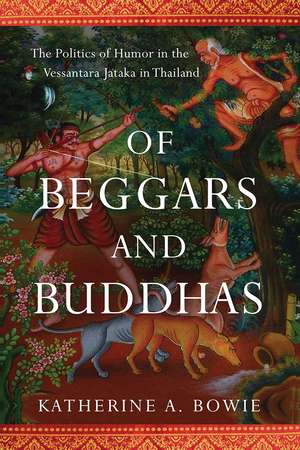Of Beggars and Buddhas: The Politics of Humor in the Vessantara Jataka in Thailand: New Perspectives in SE Asian Studies
Autor Katherine A. Bowieen Limba Engleză Paperback – 27 ian 2020
| Toate formatele și edițiile | Preț | Express |
|---|---|---|
| Paperback (1) | 190.69 lei 6-8 săpt. | |
| University of Wisconsin Press – 27 ian 2020 | 190.69 lei 6-8 săpt. | |
| Hardback (1) | 512.98 lei 6-8 săpt. | |
| University of Wisconsin Press – 20 feb 2017 | 512.98 lei 6-8 săpt. |
Din seria New Perspectives in SE Asian Studies
-
 Preț: 153.45 lei
Preț: 153.45 lei -
 Preț: 180.00 lei
Preț: 180.00 lei -
 Preț: 230.85 lei
Preț: 230.85 lei -
 Preț: 221.78 lei
Preț: 221.78 lei -
 Preț: 161.02 lei
Preț: 161.02 lei -
 Preț: 262.02 lei
Preț: 262.02 lei -
 Preț: 239.09 lei
Preț: 239.09 lei -
 Preț: 201.80 lei
Preț: 201.80 lei -
 Preț: 258.73 lei
Preț: 258.73 lei -
 Preț: 127.40 lei
Preț: 127.40 lei - 23%
 Preț: 482.73 lei
Preț: 482.73 lei - 23%
 Preț: 475.36 lei
Preț: 475.36 lei - 15%
 Preț: 587.29 lei
Preț: 587.29 lei - 23%
 Preț: 480.38 lei
Preț: 480.38 lei -
 Preț: 217.92 lei
Preț: 217.92 lei -
 Preț: 202.78 lei
Preț: 202.78 lei -
 Preț: 220.64 lei
Preț: 220.64 lei - 23%
 Preț: 442.93 lei
Preț: 442.93 lei -
 Preț: 239.28 lei
Preț: 239.28 lei -
 Preț: 231.15 lei
Preț: 231.15 lei -
 Preț: 230.56 lei
Preț: 230.56 lei - 23%
 Preț: 472.22 lei
Preț: 472.22 lei - 23%
 Preț: 534.08 lei
Preț: 534.08 lei -
 Preț: 220.64 lei
Preț: 220.64 lei - 23%
 Preț: 474.60 lei
Preț: 474.60 lei - 23%
 Preț: 473.84 lei
Preț: 473.84 lei - 19%
 Preț: 440.39 lei
Preț: 440.39 lei
Preț: 190.69 lei
Nou
Puncte Express: 286
Preț estimativ în valută:
36.49€ • 37.88$ • 30.43£
36.49€ • 37.88$ • 30.43£
Carte tipărită la comandă
Livrare economică 22 martie-05 aprilie
Preluare comenzi: 021 569.72.76
Specificații
ISBN-13: 9780299309541
ISBN-10: 0299309541
Pagini: 376
Ilustrații: 20 b-w illus., 1 table
Dimensiuni: 152 x 229 x 25 mm
Greutate: 0.5 kg
Ediția:1
Editura: University of Wisconsin Press
Colecția University of Wisconsin Press
Seria New Perspectives in SE Asian Studies
ISBN-10: 0299309541
Pagini: 376
Ilustrații: 20 b-w illus., 1 table
Dimensiuni: 152 x 229 x 25 mm
Greutate: 0.5 kg
Ediția:1
Editura: University of Wisconsin Press
Colecția University of Wisconsin Press
Seria New Perspectives in SE Asian Studies
Recenzii
"Provides historical justification for a new reading of the Vessantara Jataka and offers delightful ethnographic descriptions of its varied performance in several regions of Thailand. An excellent addition to Thai studies and to the understudied field of Southeast Asian literature."—Justin McDaniel, author of The Lovelorn Ghost and the Magic Monk: Practicing Buddhism in Modern Thailand
"This fascinating, innovative study helps us grasp significant intersections of narrative, politics, and performance in Thai Buddhist culture.—Stephen C. Berkwitz, author of South Asian Buddhism: A Survey
"A captivating and thought-provoking exploration of the Vessantara Jataka as it has taken shape and evolved across time and space in Thailand."—Reading Religion
"Unique and wonderful book. . . . Elegantly organized and a joy to read."—Bangkok Post
"Bowie's encyclopedic knowledge of the literature about Buddhism and the political history and ethnography of Thailand allows her to show the interplay between humour, morality, narrative, and politics from different perspectives. . . . The result is a vivid and nuanced analysis that is at once entertaining (how could it not be given the emphasis on humour?), compelling, and provocative."—Pacific Affairs
"This fascinating, innovative study helps us grasp significant intersections of narrative, politics, and performance in Thai Buddhist culture.—Stephen C. Berkwitz, author of South Asian Buddhism: A Survey
"A captivating and thought-provoking exploration of the Vessantara Jataka as it has taken shape and evolved across time and space in Thailand."—Reading Religion
"Unique and wonderful book. . . . Elegantly organized and a joy to read."—Bangkok Post
"Bowie's encyclopedic knowledge of the literature about Buddhism and the political history and ethnography of Thailand allows her to show the interplay between humour, morality, narrative, and politics from different perspectives. . . . The result is a vivid and nuanced analysis that is at once entertaining (how could it not be given the emphasis on humour?), compelling, and provocative."—Pacific Affairs
Notă biografică
Katherine A. Bowie is the Vilas Distinguished Achievement Professor of Anthropology at the University of Wisconsin–Madison. She is the author of Rituals of National Loyalty: An Anthropology of the State and the Village Scout Movement in Thailand.
Descriere
In Thailand, regional retellings of the Vessantara Jataka are often humorous and have antiroyalist themes, worrying the Bangkok monarchy. Katherine A. Bowie traces variations of this famous story, noting changes from its historical emphasis on generosity in feudal society to new emphases on prosperity and tourism under capitalism.
Cuprins
List of Illustrations
Acknowledgments
Note on Transliteration
Introduction: Of Monarchs, Monks, and Peasant Masses
Part I: Diversity in Humor
1 Central Thailand: Humor Defeated
2 Northeastern Thailand: Humor Diverted
3 Northern Thailand: Humor Delighted
Part II: The Politics of Diversity
5 Jujaka as Trickster: The Peasant Imaginaire
6 Jujaka as Threat: Consolidating Control
7 Jujaka’s Rebirth under Global Capitalism
Conclusion: The Journey’s End
Notes
Bibliography
Index
Acknowledgments
Note on Transliteration
Introduction: Of Monarchs, Monks, and Peasant Masses
Part I: Diversity in Humor
1 Central Thailand: Humor Defeated
2 Northeastern Thailand: Humor Diverted
3 Northern Thailand: Humor Delighted
Part II: The Politics of Diversity
5 Jujaka as Trickster: The Peasant Imaginaire
6 Jujaka as Threat: Consolidating Control
7 Jujaka’s Rebirth under Global Capitalism
Conclusion: The Journey’s End
Notes
Bibliography
Index








